Unit 2 How often do you exercise?SectionB (1a-2b)课件(共32张PPT)
文档属性
| 名称 | Unit 2 How often do you exercise?SectionB (1a-2b)课件(共32张PPT) | 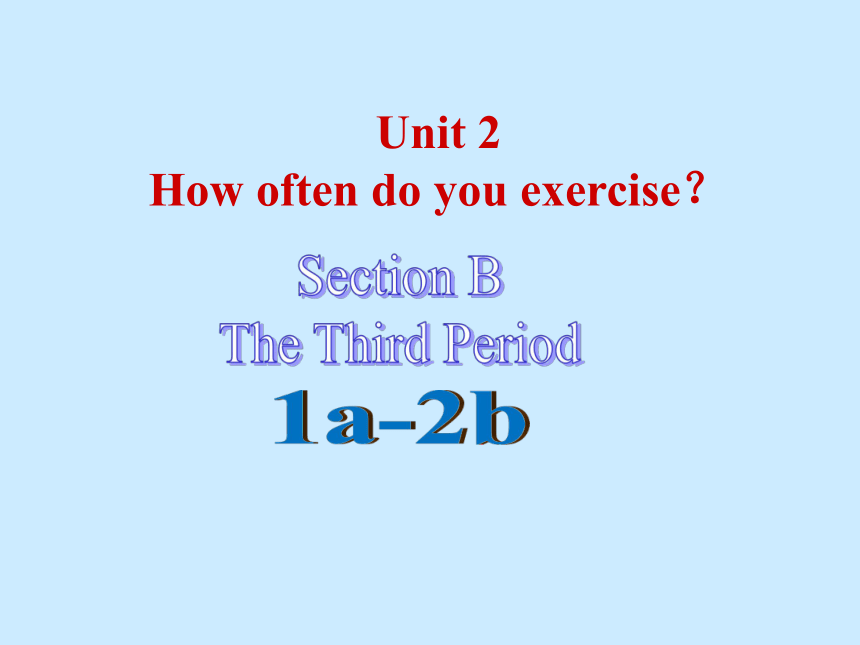 | |
| 格式 | ppt | ||
| 文件大小 | 4.0MB | ||
| 资源类型 | 教案 | ||
| 版本资源 | 人教新目标(Go for it)版 | ||
| 科目 | 英语 | ||
| 更新时间 | 2022-11-19 11:23:46 | ||
图片预览

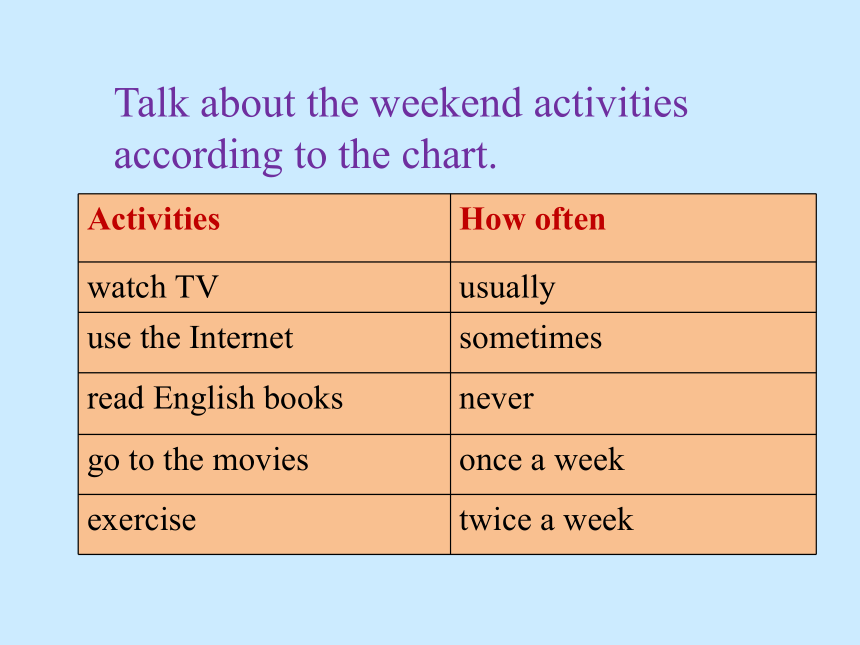
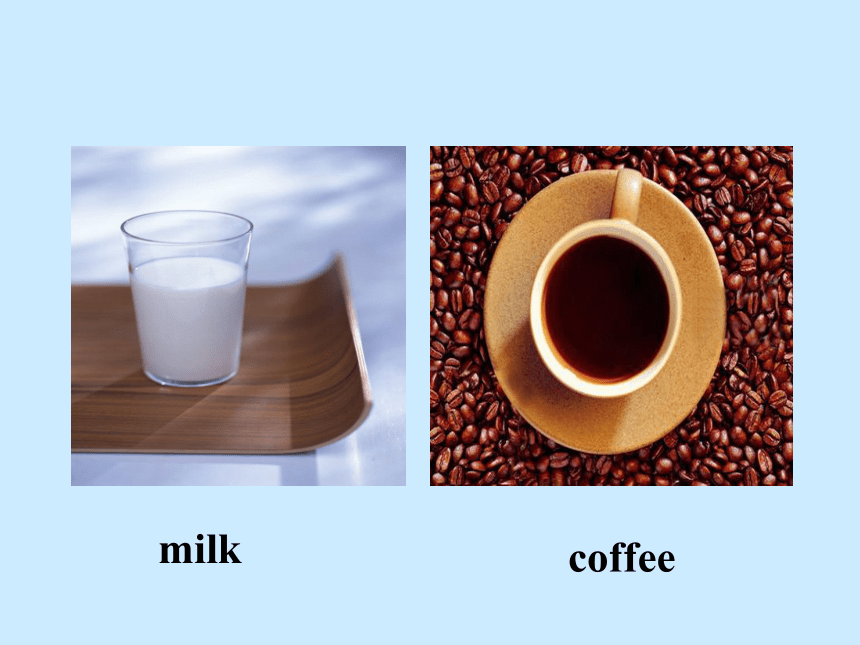
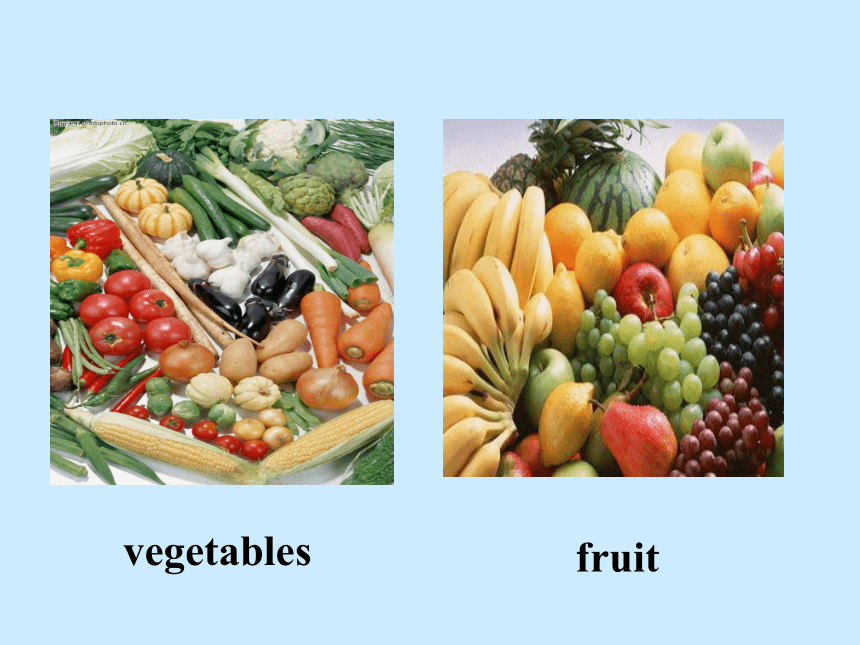
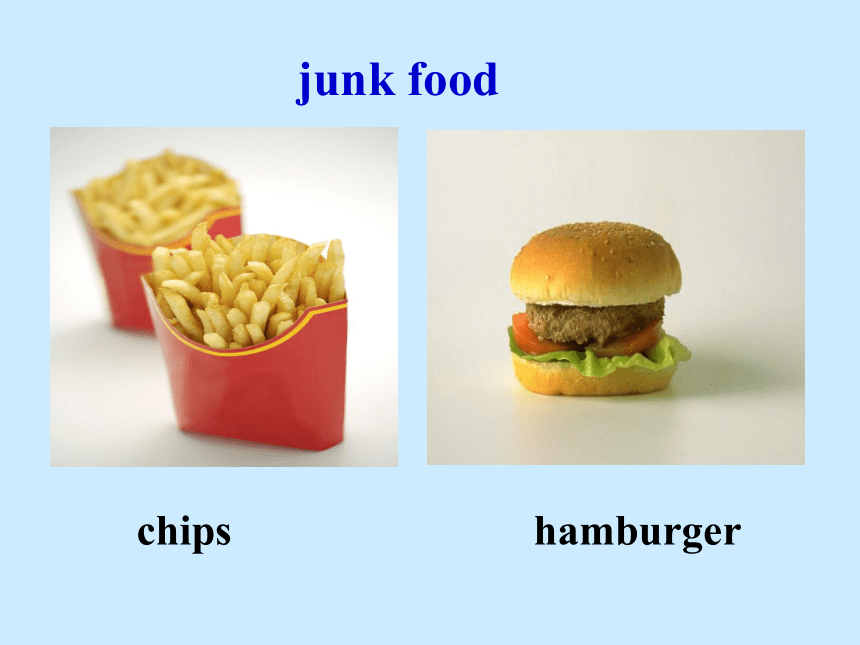
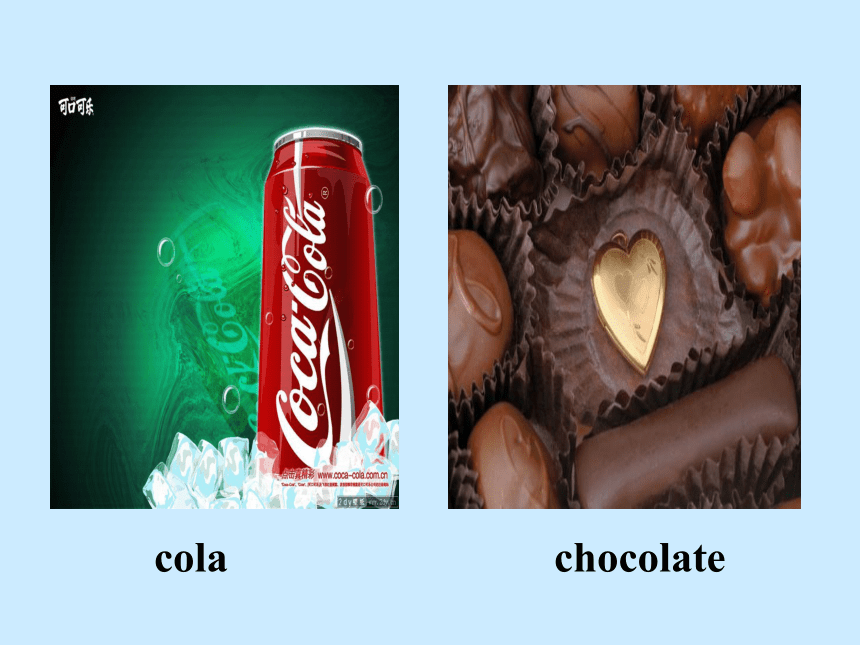


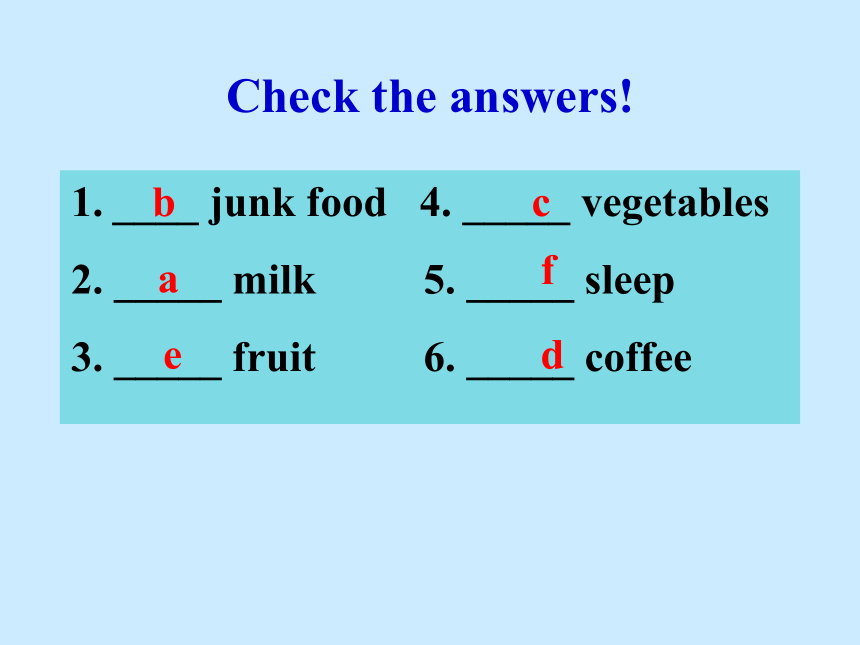
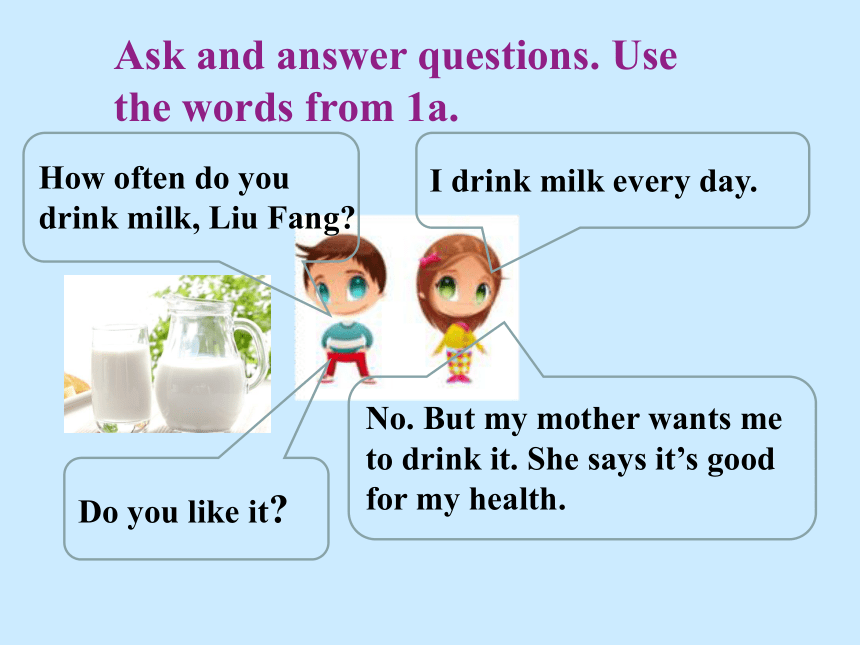
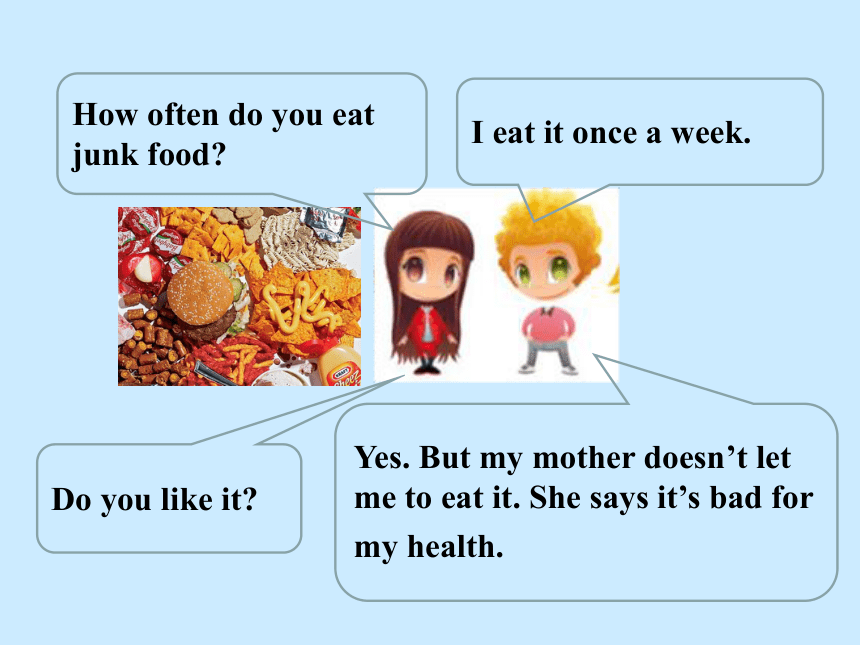

文档简介
(共32张PPT)
Unit 2
How often do you exercise?
Activities How often
watch TV usually
use the Internet sometimes
read English books never
go to the movies once a week
exercise twice a week
Talk about the weekend activities according to the chart.
milk
coffee
vegetables
fruit
chips
hamburger
junk food
cola
chocolate
is good for our health.
Junk food is bad for our health.
Match the words with the pictures.
a
b
c
d
e
f
____ junk food 4. _____ vegetables
2. _____ milk 5. _____ sleep
3. _____ fruit 6. _____ coffee
Check the answers!
b
a
e
c
f
d
Ask and answer questions. Use the words from 1a.
How often do you drink milk, Liu Fang
I drink milk every day.
Do you like it
No. But my mother wants me to drink it. She says it’s good for my health.
How often do you eat junk food
I eat it once a week.
Do you like it
Yes. But my mother doesn’t let me to eat it. She says it’s bad for my health.
☆教材解读☆
She says it’s good for my health.
本句是一个宾语从句,be good for表示“对……有益”,其反义词组为be bad for“对……有害”。
Running in the morning is good for our health.早上跑步对我们的健康有益。
Watching TV too much is bad for our eyes.看太多电视对我们的眼睛有害。
【辨析】 be good at,be good for,be good to
(1) be good at表示“擅长……,在……方面做得好”,后接名词/代词/动名词,相当于do well in。
She is good at dancing.
=She does well in dancing.她擅长跳舞。
(2)be good for对……有益(有用),后接表示人或事物的名词。
Reading is good for you.读书对你有好处。
(3)be good to对……好(和善、慈爱),后一般接表示人或人格化的名词,good相当于friendly。
He is very good to his neighbors.他对他的邻居们很好。
healthy:
unhealthy:
cola, salad, soup, hot dog, milk, hamburger, dumpling, fruit, chicken, onion, potato, tomato
healthy:
unhealthy:
salad, soup, milk, dumpling, onion, fruit, chicken, potato, tomato
cola, hot dog, hamburger
Listen to an interview about eating
habits. Circle your answer to each
question.
Does Tina have good habits Yes. No. I don’t know.
Does Bill have good habits Yes. No. I don’t know.
Listen again. Fill in the blanks in
the survey.
Questions Tina Bill
1.How often do you exercise
2.How often do you eat fruit
3.How many hours do you sleep every night
4.How often do you drink milk
5.How often do you eat junk food
6.How often do you drink coffee
Every day
Nine
Never
Every day
Hardly ever
never
Every day
Nine
3 or 4 times
a week
Never
2 or 3 times a
week
4 times a day
☆教材解读☆
How many hours do you sleep every day
本句是特殊疑问句,how many后要接可数名词复数,再加一般疑问句。而how much后要接不可数名词,再加一般疑问句。
How many bananas are there in the basket 这个篮子里有多少香蕉
How much water do you need 你需要多少水
Student A is the reporter. Student
B is Tina or Bill. Ask and answer
questions. Then change roles.
A: How often do you exercise
B: I exercise every day.
A: And how often do you …
Rank these activities according to how often you think your classmates do them (1=most often, 6= least often).
watch TV
go to the movies
play computer games
exercise or play sports
use the Internet
go camping in the country
Read the articles fast and find the general idea of 2b.
The general idea of the articles is about .
A.how to use the Internet
B.free time activities in No.5 High School
C.how to make friends
B
☆教材解读☆
1.percent
n.百分之……。常用于“数词+percent +of+ sth.”结构,这时后面谓语的单复数由percent后面跟的名词决定。
Twenty percent of the students agree with you.百分之二十的学生赞同你。
Thirty percent of time passes.百分之三十的时间过去了。
2.although
conj.虽然;尽管;即使。引导让步状语从句。
Although/Though it was so cold,he went out without an overcoat.尽管天气很冷,但他还是没有穿大衣就出去了。
【注意】 although=though用作连词,意为“虽然,尽管”,这两个词都不能与but连用,即用了although/though就不能再用but。不过although可以与yet/still一起使用。
尽管他身体不好,但是他工作很努力。
正:Although/Though he is in poor health,he works hard.
正:He is in poor health,but he works hard.
误:Although he is in poor health,but he works hard.
3.mind
n.头脑,心智。
He has a very sharp mind.他的头脑很敏锐。
【拓展】 mind v.介意,当心,关心。mind后用动名词或名词作宾语,而不用不定式。Do/Would you mind (one’s)doing… 用来客气地提出请求,或者用来提出询问、征求对方意见。
Do you mind closing this window 你介意关上这扇窗户吗
【固定搭配】 make up one’s mind下决心;change one’s mind改变主意;never mind不必担心/没关系;keep in one’s mind记住。
Read the passage quickly and find the answers to the questions below.
(1)How many kinds of free time activities are mentioned in the passage
(2)How many students do not exercise at all
(3)How many students use the Internet every day
(4)How often do most students watch TV
(5)What is the best way to relax
Three.
Twenty percent.
Ninety percent.
Every day.
The best way to relax is through exercise.
Please read the passage and circle“T”or“F”.
1.We found that forty-five percent of our students exercise every day.
2.Ten percent of the students use the Internet at least three or four times a week.
3.Most students use the Internet for homework.
4.Only twenty percent of the students watch TV one to three times a week.
5.Doing exercise is healthy for the mind and the body.
F
T
F
F
T
☆教材解读☆
1….but we were surprised that ninety percent of them use the Internet every day.
“be surprised + that从句”意为“……很惊讶/吃惊”。be surprised at sth.意为“对某事感到惊讶”; be surprised to do sth.意为“对做某事感到惊讶”。
I’m surprised that you are the only one to think in that way.我奇怪,你是唯一那样想的人。
I was surprised at his answer.我对他的回答感到吃惊。
【辨析】 to one’s surprise,in surprise,be surprised at
(1) to one’s surprise是“令人惊奇的是……”,surprise是名词,one’s指形容词性物主代词或所有格,to one’s surprise相当于“主语+ be+ surprised”,surprised是形容词。
To his surprise he found the girl was blind.
=He was surprised to find the girl was blind.令他惊奇的是,他发现这个女孩是个盲人。
(2) in surprise是“惊奇地”,是副词性短语,用来修饰动词,一般放在所修饰的动词后面。
The two girls looked at each other in surprise.那两个女孩惊奇地相互看着。
(3) be surprised at是“对……感到惊奇”,表示主语(一般是人)对某事或某物惊奇,surprised可以被very,too等修饰,作表语或定语。
We are very surprised at the news.听到这个消息我们很诧异。
2.The answers to our questions about watching television were also interesting.
此句的基本意思是The answers were also interesting.主语The answers为复数,故谓语动词使用were。
【注意】 本句中answer和question两个名词后的介词搭配。表示“……的答案”时,answer后要用介词to,这是一种固定搭配。
There’s no easy answer to this problem.这个问题没有简单的答案。
Do you know the answer to question number two 你知道第二个问题的答案吗
3.It is good to relax by using the Internet or watching game shows…
◆It is/was +adj.(for sb.)+ to do sth.对某人来说去做某事是……的。
It is easy for me to learn English well.学好英语对我来说很容易。
◆by+v.-ing构成方式状语,表示“通过某种方式、手段做某事”,by后接名词、代词、动名词形式。
She made money by writing.她靠写作挣钱。
He succeeded by working hard.他由于工作努力而获得了成功。
Exercises : the end-of-class test
Ⅰ.根据汉语提示完成句子
1.Twenty (百分之……)of our class like using the Internet.
2.He has three (在线的)friends and they talk every day.
3. (尽管)he is only five years old,he can speak three languages.
4.Can you tell me the (结果)about what your favorite program is
5.Last week my father bought a
new (电视机).
percent
online
Although
result
television
Ⅱ.根据汉语意思完成句子
1.关于我们问的看电视的问题的回答是很有趣的。
The our questions about watching television were interesting.
2.调查显示,许多孩子上网仅仅是为了娱乐。
According to the survey,lots of
children just .
3.我喜欢运动,例如跑步和打网球。
I like sports, and playing tennis.
4.我们学校多数学生每周锻炼三到五次。
Most students in our school at
least a week.
5.这对我的眼睛有好处。
It my eyes.
is good for
answers to
go online
for fun
such as running
exercise
three to five times
Unit 2
How often do you exercise?
Activities How often
watch TV usually
use the Internet sometimes
read English books never
go to the movies once a week
exercise twice a week
Talk about the weekend activities according to the chart.
milk
coffee
vegetables
fruit
chips
hamburger
junk food
cola
chocolate
is good for our health.
Junk food is bad for our health.
Match the words with the pictures.
a
b
c
d
e
f
____ junk food 4. _____ vegetables
2. _____ milk 5. _____ sleep
3. _____ fruit 6. _____ coffee
Check the answers!
b
a
e
c
f
d
Ask and answer questions. Use the words from 1a.
How often do you drink milk, Liu Fang
I drink milk every day.
Do you like it
No. But my mother wants me to drink it. She says it’s good for my health.
How often do you eat junk food
I eat it once a week.
Do you like it
Yes. But my mother doesn’t let me to eat it. She says it’s bad for my health.
☆教材解读☆
She says it’s good for my health.
本句是一个宾语从句,be good for表示“对……有益”,其反义词组为be bad for“对……有害”。
Running in the morning is good for our health.早上跑步对我们的健康有益。
Watching TV too much is bad for our eyes.看太多电视对我们的眼睛有害。
【辨析】 be good at,be good for,be good to
(1) be good at表示“擅长……,在……方面做得好”,后接名词/代词/动名词,相当于do well in。
She is good at dancing.
=She does well in dancing.她擅长跳舞。
(2)be good for对……有益(有用),后接表示人或事物的名词。
Reading is good for you.读书对你有好处。
(3)be good to对……好(和善、慈爱),后一般接表示人或人格化的名词,good相当于friendly。
He is very good to his neighbors.他对他的邻居们很好。
healthy:
unhealthy:
cola, salad, soup, hot dog, milk, hamburger, dumpling, fruit, chicken, onion, potato, tomato
healthy:
unhealthy:
salad, soup, milk, dumpling, onion, fruit, chicken, potato, tomato
cola, hot dog, hamburger
Listen to an interview about eating
habits. Circle your answer to each
question.
Does Tina have good habits Yes. No. I don’t know.
Does Bill have good habits Yes. No. I don’t know.
Listen again. Fill in the blanks in
the survey.
Questions Tina Bill
1.How often do you exercise
2.How often do you eat fruit
3.How many hours do you sleep every night
4.How often do you drink milk
5.How often do you eat junk food
6.How often do you drink coffee
Every day
Nine
Never
Every day
Hardly ever
never
Every day
Nine
3 or 4 times
a week
Never
2 or 3 times a
week
4 times a day
☆教材解读☆
How many hours do you sleep every day
本句是特殊疑问句,how many后要接可数名词复数,再加一般疑问句。而how much后要接不可数名词,再加一般疑问句。
How many bananas are there in the basket 这个篮子里有多少香蕉
How much water do you need 你需要多少水
Student A is the reporter. Student
B is Tina or Bill. Ask and answer
questions. Then change roles.
A: How often do you exercise
B: I exercise every day.
A: And how often do you …
Rank these activities according to how often you think your classmates do them (1=most often, 6= least often).
watch TV
go to the movies
play computer games
exercise or play sports
use the Internet
go camping in the country
Read the articles fast and find the general idea of 2b.
The general idea of the articles is about .
A.how to use the Internet
B.free time activities in No.5 High School
C.how to make friends
B
☆教材解读☆
1.percent
n.百分之……。常用于“数词+percent +of+ sth.”结构,这时后面谓语的单复数由percent后面跟的名词决定。
Twenty percent of the students agree with you.百分之二十的学生赞同你。
Thirty percent of time passes.百分之三十的时间过去了。
2.although
conj.虽然;尽管;即使。引导让步状语从句。
Although/Though it was so cold,he went out without an overcoat.尽管天气很冷,但他还是没有穿大衣就出去了。
【注意】 although=though用作连词,意为“虽然,尽管”,这两个词都不能与but连用,即用了although/though就不能再用but。不过although可以与yet/still一起使用。
尽管他身体不好,但是他工作很努力。
正:Although/Though he is in poor health,he works hard.
正:He is in poor health,but he works hard.
误:Although he is in poor health,but he works hard.
3.mind
n.头脑,心智。
He has a very sharp mind.他的头脑很敏锐。
【拓展】 mind v.介意,当心,关心。mind后用动名词或名词作宾语,而不用不定式。Do/Would you mind (one’s)doing… 用来客气地提出请求,或者用来提出询问、征求对方意见。
Do you mind closing this window 你介意关上这扇窗户吗
【固定搭配】 make up one’s mind下决心;change one’s mind改变主意;never mind不必担心/没关系;keep in one’s mind记住。
Read the passage quickly and find the answers to the questions below.
(1)How many kinds of free time activities are mentioned in the passage
(2)How many students do not exercise at all
(3)How many students use the Internet every day
(4)How often do most students watch TV
(5)What is the best way to relax
Three.
Twenty percent.
Ninety percent.
Every day.
The best way to relax is through exercise.
Please read the passage and circle“T”or“F”.
1.We found that forty-five percent of our students exercise every day.
2.Ten percent of the students use the Internet at least three or four times a week.
3.Most students use the Internet for homework.
4.Only twenty percent of the students watch TV one to three times a week.
5.Doing exercise is healthy for the mind and the body.
F
T
F
F
T
☆教材解读☆
1….but we were surprised that ninety percent of them use the Internet every day.
“be surprised + that从句”意为“……很惊讶/吃惊”。be surprised at sth.意为“对某事感到惊讶”; be surprised to do sth.意为“对做某事感到惊讶”。
I’m surprised that you are the only one to think in that way.我奇怪,你是唯一那样想的人。
I was surprised at his answer.我对他的回答感到吃惊。
【辨析】 to one’s surprise,in surprise,be surprised at
(1) to one’s surprise是“令人惊奇的是……”,surprise是名词,one’s指形容词性物主代词或所有格,to one’s surprise相当于“主语+ be+ surprised”,surprised是形容词。
To his surprise he found the girl was blind.
=He was surprised to find the girl was blind.令他惊奇的是,他发现这个女孩是个盲人。
(2) in surprise是“惊奇地”,是副词性短语,用来修饰动词,一般放在所修饰的动词后面。
The two girls looked at each other in surprise.那两个女孩惊奇地相互看着。
(3) be surprised at是“对……感到惊奇”,表示主语(一般是人)对某事或某物惊奇,surprised可以被very,too等修饰,作表语或定语。
We are very surprised at the news.听到这个消息我们很诧异。
2.The answers to our questions about watching television were also interesting.
此句的基本意思是The answers were also interesting.主语The answers为复数,故谓语动词使用were。
【注意】 本句中answer和question两个名词后的介词搭配。表示“……的答案”时,answer后要用介词to,这是一种固定搭配。
There’s no easy answer to this problem.这个问题没有简单的答案。
Do you know the answer to question number two 你知道第二个问题的答案吗
3.It is good to relax by using the Internet or watching game shows…
◆It is/was +adj.(for sb.)+ to do sth.对某人来说去做某事是……的。
It is easy for me to learn English well.学好英语对我来说很容易。
◆by+v.-ing构成方式状语,表示“通过某种方式、手段做某事”,by后接名词、代词、动名词形式。
She made money by writing.她靠写作挣钱。
He succeeded by working hard.他由于工作努力而获得了成功。
Exercises : the end-of-class test
Ⅰ.根据汉语提示完成句子
1.Twenty (百分之……)of our class like using the Internet.
2.He has three (在线的)friends and they talk every day.
3. (尽管)he is only five years old,he can speak three languages.
4.Can you tell me the (结果)about what your favorite program is
5.Last week my father bought a
new (电视机).
percent
online
Although
result
television
Ⅱ.根据汉语意思完成句子
1.关于我们问的看电视的问题的回答是很有趣的。
The our questions about watching television were interesting.
2.调查显示,许多孩子上网仅仅是为了娱乐。
According to the survey,lots of
children just .
3.我喜欢运动,例如跑步和打网球。
I like sports, and playing tennis.
4.我们学校多数学生每周锻炼三到五次。
Most students in our school at
least a week.
5.这对我的眼睛有好处。
It my eyes.
is good for
answers to
go online
for fun
such as running
exercise
three to five times
同课章节目录
- Unit 1 Where did you go on vacation?
- Section A
- Section B
- Unit 2 How often do you exercise?
- Section A
- Section B
- Unit 3 I'm more outgoing than my sister.
- Section A
- Section B
- Unit 4 What's the best movie theater?
- Section A
- Section B
- Unit 5 Do you want to watch a game show?
- Section A
- Section B
- Unit 6 I'm going to study computer science.
- Section A
- Section B
- Unit 7 Will people have robots?
- Section A
- Section B
- Unit 8 How do you make a banana milk shake?
- Section A
- Section B
- Unit 9 Can you come to my party?
- Section A
- Section B
- Unit 10 If you go to the party, you'll have a grea
- Section A
- Section B
